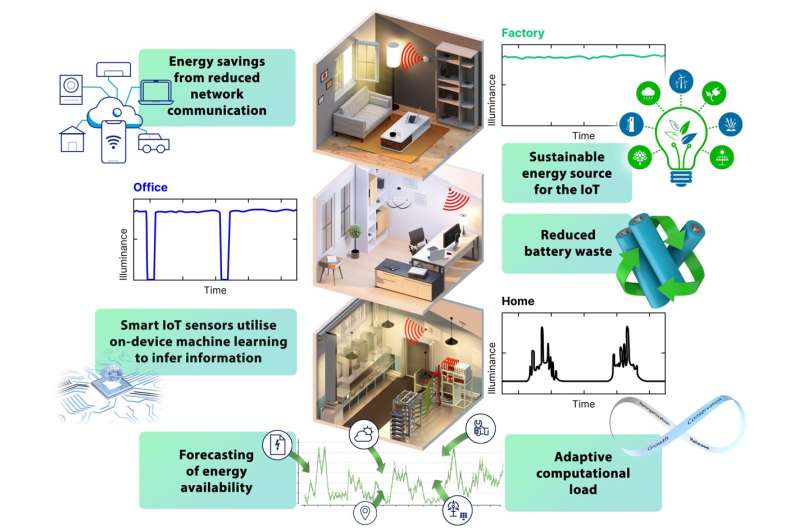This article has been reviewed according to Science X's editorial process and policies. Editors have highlighted the following attributes while ensuring the content's credibility:
fact-checked
peer-reviewed publication
trusted source
proofread
Scientists create high-efficiency sustainable solar cells for IoT devices with AI-powered energy management

Newcastle University researchers have created environmentally-friendly, high-efficiency photovoltaic cells that harness ambient light to power internet of Things (IoT) devices.
Led by Dr. Marina Freitag, the research group from the from School of Natural and Environmental Sciences (SNES) created dye-sensitized photovoltaic cells based on a copper(II/I) electrolyte, achieving an unprecedented power conversion efficiency of 38% and 1.0V open-circuit voltage at 1,000 lux (fluorescent lamp). The cells are non-toxic and environmentally friendly, setting a new standard for sustainable energy sources in ambient environments.
Published in the journal Chemical Science, the research has the potential to revolutionize the way IoT devices are powered, making them more sustainable and efficient, and opening up new opportunities in industries such as health care, manufacturing, and smart city development.
Dr. Freitag, Principal Investigator at SNES, Newcastle University, said, "Our research marks an important step towards making IoT devices more sustainable and energy-efficient. By combining innovative photovoltaic cells with intelligent energy management techniques, we are paving the way for a multitude of new device implementations that will have far-reaching applications in various industries."
The team also introduced a pioneering energy management technique, employing long short-term memory (LSTM) artificial neural networks to predict changing deployment environments and adapt the computational load of IoT sensors accordingly. This dynamic energy management system enables the energy-harvesting circuit to operate at optimal efficiency, minimizing power losses or brownouts.
This breakthrough study demonstrates how the synergy of artificial intelligence and ambient light as a power source can enable the next generation of IoT devices. The energy-efficient IoT sensors, powered by high-efficiency ambient photovoltaic cells, can dynamically adapt their energy usage based on LSTM predictions, resulting in significant energy savings and reduced network communication requirements.
More information: Hannes Michaels et al, Emerging indoor photovoltaics for self-powered and self-aware IoT towards sustainable energy management, Chemical Science (2023). DOI: 10.1039/D3SC00659J















